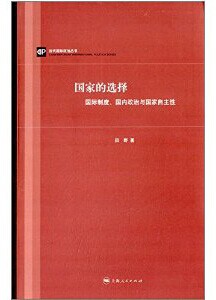New approach to study of international systems

A Nation’s Choice: International Institutions, Domestic Politics and National Autonomy
Author: Tian Ye
Publisher: Shanghai People’s Publishing House
With a research focus on international political economy, the author Tian Ye shows his boldness by integrating national politics into the study of international systems based on the approach of Open Economic Politics (OEP), which emerged in the 1990s. In 2014, his new book A Nation’s Choice: International Institution, Domestic Politics and National Autonomy was published. Tian Ye’s second treatise, the book is a part of the renowned Contemporary International Politics Series and has three remarkable features.
First, the core issue of discussion is how international systems as independent variables affect the autonomy of a state as the dependent variable. The book suggests a causal mechanism that influences on autonomy are exerted through three functions of international systems: reallocation of powers, commitment and political mobilization. It is evident that Tian Ye has gone far beyond reviewing related theories to begin constructing his own.
Second, it represents all the steps of a complete empirical approach — raise questions, define concepts, literature review, theoretical construction and case study — serving as a standard reference for the teaching of methodology of international studies.
In addition, Tian Ye demonstrates his characteristic rationality in his choice of approaches, showing once again the effectiveness of the research methods of economics in international studies. Relative to economics, sociology and even comparative politics, it is difficult for international studies to accurately quantify key variables like powers, systems and perceptions as well as to conduct field research on subjects of study. Consequently, international studies are often criticized for not being scientific enough to provide interpretation and prediction.
Though he takes a cautious attitude toward the statistical and model approaches that have recently gained popularity in the West, Tian Ye rigorously attempts to be as scientific as possible by meticulously controlling variables, carefully selecting cases and elaborating logically.
Third, the book is demonstrative of the author’s insight into the frontier of international studies. As a significant part of international political economy, the study of international systems has developed for more than 40 years. In the 1990s, mainstream scholars on international political economy, or the so-called “IO school,” named as such for their articles published by International Organization, stopped constructing macroscopic theories and began to bring national politics back to international studies. This shift gave rise to the approach of OEP, which has attracted many followers and now tends to dominate the study of international political economy.
Tian Ye’s research is at the forefront of this trend. The slight difference is that the OEP approach focuses on how national politics affects international relations by weighing internal systems while Tian Ye centers on how international systems affect the autonomy of a state by exerting influences on the nation.
At present, as changes in the balance of power between China and the United States continue to amplify structural contradictions, traditional realism has once again become the focus of the academic community in China thanks to its overwhelming advantages in the discourse of academics or policies. However, we still have reasons to believe that under the pressure of the realistic discourse, studies of international systems will not fade but burst forth more dynamically.
Li Wei is from the School of International Studies at Renmin University of China.
The Chinese version appeared in Chinese Social Sciences Today, No. 644, September 10, 2014.
Translated by Ren Jingyun
